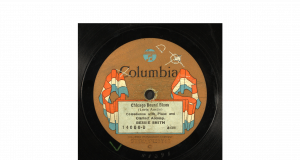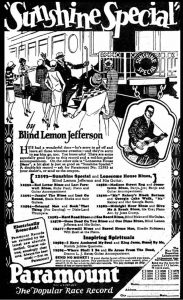
Smith, Bessie, Lovie Austin, Don Redman, Fletcher Henderson, and Lovie Austin. Chicago Bound Blues. 1923. Audio. https://www.loc.gov/item/jukebox-672304/.
Bessie Smith was born in 1894 or 1895 in Chattanooga, Tennessee. One of seven siblings in a poor household, Bessie came from the humblest of beginnings possible. From a young age, Smith worked as a street performer, much to her older sister’s chagrin, and in 1912, she began to play more public shows which resulted in her being noticed by blues legend Ma Rainey1. Rainey mentored Smith, and eventually Smith was playing shows with herself as the star of the night.
In 1923, Smith was signed to Columbia Records during a time where “race music” or music by Black artists for Black singers was an incredibly an incredibly lucrative side of the music industry. While “race music” artists were given a degree of creative freedom in the musical process, they were often underpaid as it was the record label executives that were making the real money. Black voices and experiences became a commodity that could be sold to White and Black listeners alike.

Advertisement from The Chicago Defender, from “Extra! Chicago Defender Race Records Ads Show South from Afar” by Mark K. Dolan
Many of these ads would co-opt Black vernacular and “spoke through minstrel stereotypes, in part echoing the tent-show venues where performers such as Rainey toiled for years and where Bessie Smith reportedly stood her ground against Ku Klux Klan riders…”2 (Dolan, 110). Songs, such as “Chicago Bound Blues” which references the Defender, that referenced the Great Migration were greatly lucrative to record companies as Black singers lamenting over their experiences was highly profitable.
Black artists that wanted to see a small modicum of financial success by recording were stuck between a rock and a hard place in the recording industry, as before the 1920’s, the only sanctioned versions of expressing Black identity through music were minstrelsy or spirituals3. “Race music”, however, presented a new opportunity for Black Artists to artistically express themselves. Bessie Smith’s legendary career and impact on the blues can not be overstated, but it must not go unmentioned how she was still advertised via stereotypes and grossly underpaid.
1 Boomer, Lee. n.d. “Life Story: Bessie Smith (1894 or 1895–1937).” Women & the American Story. Accessed September 27, 2023. https://wams.nyhistory.org/confidence-and-crises/jazz-age/bessie-smith/#resource.
2 Dolan, Mark K. “Extra! Chicago Defender Race Records Ads Show South from Afar.” Southern Cultures 13, no. 3 (2007): 106–24. https://www.jstor.org/stable/26391067.
3 Brackett, David. “Forward to the Past: Race Music in the 1920s.” In Categorizing Sound: Genre and Twentieth-Century Popular Music, 1st ed., 69–112. University of California Press, 2016. http://www.jstor.org/stable/10.1525/j.ctt1c84fg2.9.
Works Cited
Boomer, Lee. n.d. “Life Story: Bessie Smith (1894 or 1895–1937).” Women & the American Story. Accessed September 27, 2023. https://wams.nyhistory.org/confidence-and-crises/jazz-age/bessie-smith/#resource.
Dolan, Mark K. “Extra! Chicago Defender Race Records Ads Show South from Afar.” Southern Cultures 13, no. 3 (2007): 106–24. https://www.jstor.org/stable/26391067.
Brackett, David. “Forward to the Past: Race Music in the 1920s.” In Categorizing Sound: Genre and Twentieth-Century Popular Music, 1st ed., 69–112. University of California Press, 2016. http://www.jstor.org/stable/10.1525/j.ctt1c84fg2.9.
Streaty, Donna. “EMPRESS OF THE BLUES: BESSIE SMITH.” Negro History Bulletin 44, no. 1 (1981): 22–22. http://www.jstor.org/stable/44176459.
Smith, Bessie, Lovie Austin, Don Redman, Fletcher Henderson, and Lovie Austin. Chicago Bound Blues. 1923. Audio. https://www.loc.gov/item/jukebox-672304/.
